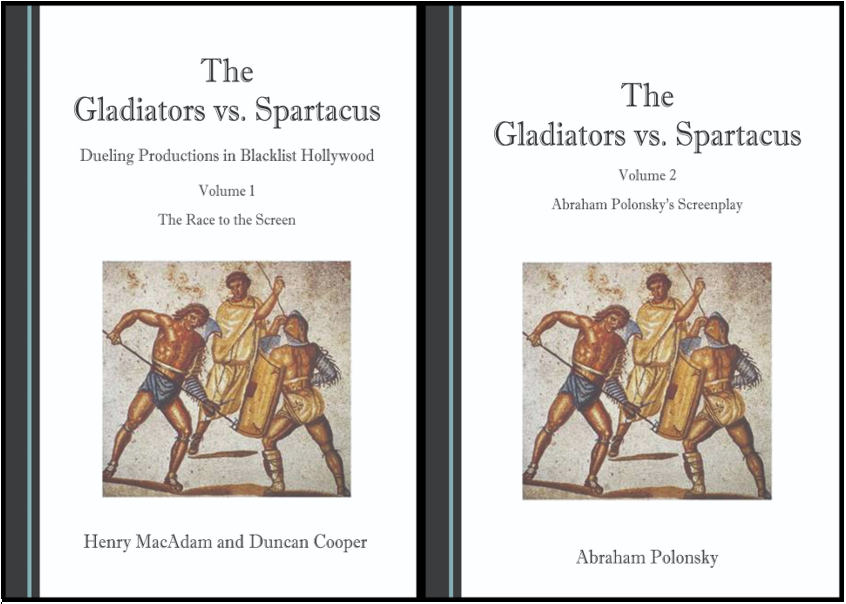Articles of interest
04th August 2021
Featured Review
The Gladiators Vs. Spartacus
Volume 1: The Race to the Screen
Volume 2: Abraham Polonsky's Screenplay

By Henry MacAdam and Duncan Cooper
Reviewed by Brian Neve
Perhaps appropriately, this is quite an epic undertaking. There are two volumes that together stretch (with supplementary material and bibliographies) to over 1,000 pages. Anyone interested in the dramaturgy of the Spartacus revolt in Roman history, and in novels and films that represent those events, will find much that is valuable here. Central to the project are accounts of two intended Hollywood productions of the late 1950s, both of them written and adapted by blacklisted screenwriters from significant novels on the events, and legends, of Spartacus and the slave revolt against the Roman Empire. There is new material and analysis relating to the film Spartacus (Stanley Kubrick, 1960, from a screenplay by Dalton Trumbo) and its complicated production history, but what particularly distinguishes these two books is their focus on a rival project (not previously much discussed) to bring The Gladiators, Arthur Koestler’s historical novel of 1939, to the screen. Central to the second volume is a complete screenplay for this production, written by the renowned novelist, screenwriter and sometimes director (also blacklisted at the time, like Trumbo), Abraham Polonsky.
While the work covers a number of contexts, from the politics and aesthetics of representing the slave revolt, and ‘revolution’ in general, to the particular features of Polonsky’s work, there is a recurring focus on issues of adaptation, from novel to screenplay, and on historical and other choices in the construction and presentation of Roman history. At the same time the authors deal with the interrelated production histories of the two Hollywood projects, and the way in which these processes impinged on the Hollywood blacklist. Consuming the two volumes from start to finish—which I suspect will not be the normal approach—the story sometimes gets a bit convoluted and over-detailed at times. It is a very large undertaking, full of references back, not to mention addendums, postscripts, epilogues, and some stylistic variations. However, for anyone interested in the problematic history of these works, in issues of adaptation, and in Hollywood processes at the time, when the blacklist was at last being challenged, there is material of great interest. There is also good material on the role of ‘independent’ production companies and key agencies and studios (and their moguls and executives) in the late Fifties.
Central to the whole publishing project is the figure of Abraham Polonsky, and the work brings to the public domain one of the writer’s unpublished screenplays, exploring it in masterly fashion in historical and literary terms. It is more difficult, however, to assess the cinematic potential of an unrealised screenplay, and Polonsky himself seemed to have blown hot and cold on the project, at a time when he believed that it was the director who made the decisive impact in the film industry. His health, not to mention the blacklist, made this impossible at the time. The script is presented along with very extensive notes which are particularly authoritative on the way novelists and screenwriters made choices in terms of the classical and religious sources for the Spartacus/slave revolt story. This textual annotation of the Polonsky screenplay is a particularly valuable element.
It is good to have the screenplay itself (unfinished as it may be), and the extracts from Polonsky’s 1958 journals are also of particular value, illuminating some of his working methods, key influences (including Henry Adams), and the experience of the blacklist. There is also good treatment of his ‘Triumph of Alexander the Great’ teleplay (the journal entries were clearly very difficult to decipher and transcribe, and the authors are to be congratulated for their efforts). On occasion, I felt that there could have been more depth and nuance to the treatment of Polonsky’s thinking about film. Although Polonsky’s August 1956 Masses & Mainstream article is referenced, some more depth on his politics in this period, and the politics of the blacklist, might have been useful.
In terms of features that seem to me to work less well, I mentioned above the occasional stylistic differences. Perhaps this is inevitable and indeed fruitful in a collaborative work. Some of the later chapters on Spartacus (1960), and on Koestler, and Kubrick, seem to me to be more trenchantly written compared to the long ‘production history’ treatment in Volume 1, and some discussion of The Gladiators. Perhaps the key strands of the argument could have been underlined, particularly in relation to Volume 1. The lively and valuable discussion of Kubrick and his interest in Koestler, late in Vol. 2, might perhaps have been enhanced by use of Kubrick’s London archive.
There are some other small points. There is brief reference to Viva Zapata! (Steinbeck/Kazan, 1952) for example, but I’m not sure if the Steinbeck/Kazan film was a success at the box office—Darryl F. Zanuck certainly didn’t think so (Vol. 2, 485). Does it get very far to compare Josef Stalin and Senator Joseph McCarthy as fellow ‘criminal opportunists’ (Vol 2, 531)?
However, overall, this is a major achievement, indicating impressive scholarship and providing a valuable collection of research. The publishers have done an excellent job in presenting this work.
Brian Neve is a Visiting Fellow at the University of the West of England, UK. He has written extensively on American film and history, and in particular on the Hollywood Left and the blacklist, co-editing the volume “Un-American” Hollywood: Politics and Film in the Blacklist Era with Frank Krutnik, Steve Neale, and Peter Stanfield in 2007 (Rutgers University Press). To learn more about Brian and his work, please visit: http://www.brianneve.com

The Gladiators vs. Spartacus, Volume 1: Dueling Productions in Blacklist Hollywood and Volume 2: Abraham Polonsky's Screenplay are available now in Paperback, Hardback and eBook formats. Enter the code PROMO25 at the checkout for a 25% discount on the print editions.










